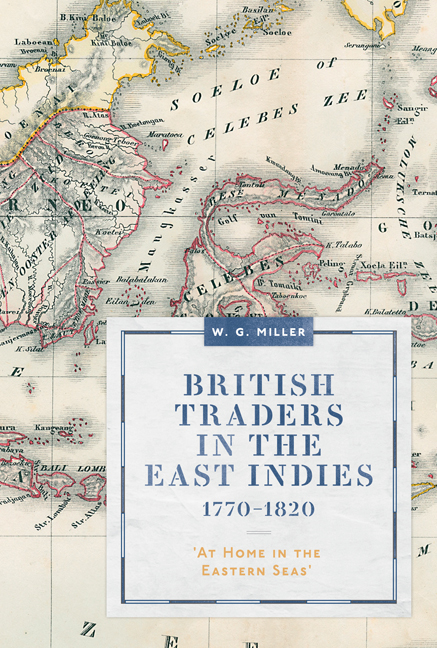Book contents
- Frontmatter
- Dedication
- Contents
- List of illustrations
- Preface
- Acknowledgements
- A note on orthography and unit conversion
- Abbreviations
- Map
- Introduction: the Indian origins of the British country trade
- Chapter One Merchant friends: country traders and the Malays I
- Chapter Two Political allies: country traders and the Malays II
- Chapter Three Inadvertent imperialists: country traders and British officials
- Chapter Four Smugglers and enemies: country traders and the Dutch
- Chapter Five The decline of the country trade in the Malay Archipelago
- Conclusion
- A note on sources
- Bibliography
- Index
- WORLDS OF THE EAST INDIA COMPANY
Chapter One - Merchant friends: country traders and the Malays I
Published online by Cambridge University Press: 16 September 2020
- Frontmatter
- Dedication
- Contents
- List of illustrations
- Preface
- Acknowledgements
- A note on orthography and unit conversion
- Abbreviations
- Map
- Introduction: the Indian origins of the British country trade
- Chapter One Merchant friends: country traders and the Malays I
- Chapter Two Political allies: country traders and the Malays II
- Chapter Three Inadvertent imperialists: country traders and British officials
- Chapter Four Smugglers and enemies: country traders and the Dutch
- Chapter Five The decline of the country trade in the Malay Archipelago
- Conclusion
- A note on sources
- Bibliography
- Index
- WORLDS OF THE EAST INDIA COMPANY
Summary
To help understand how the country traders collected the products of the Malay Archipelago so necessary for the China trade, it is valuable to examine the nature of the contacts between them and the people and rulers of the region. Little is known about many of the country traders of this time. A select few, such as Francis Light, the founder of Penang, have always enjoyed the limelight in historical narratives, but most of his compatriots seldom find a place, though their activities as intermediaries between the local Malays and the outside world were of great importance at a time when the dealings of many Malays with foreigners were curtailed by the VOC. Even from the few sources available, it is possible to ascertain that a large number of lesser-known English country traders were regular visitors and sojourners. Like Light, many felt at home in Malay society, advising local rulers, and generally associating with both the Malay nobility and common people while trading. Through examples of the cross-cultural interaction between the two parties – British country traders and Malays – a more detailed picture will emerge of the variety of individuals involved in the country trade, the different levels of relationship which resulted in the successful trading patterns that developed over many decades, and the impact these contacts had on historical events in several Malay societies.
The Malay world in the late eighteenth century
The British country traders operated during a critical phase of the history of the Malay states; a time when the Malay community was adjusting to an increasing European influence. The country traders were themselves an important element in this influence. Furthermore, our understanding of the way the local Malay communities evolved in the later decades of the eighteenth and the early decades of the nineteenth centuries may be enhanced by a closer look at the sporadic and inadequately recorded interactions between the Malays and their British trading partners.
The Malay world of this period encompassed Malay-speaking people living in trading communities both in coastal (pesisir) areas and, to a lesser extent in the hinterlands, of Borneo, Sumatra and the Malay Peninsula.
- Type
- Chapter
- Information
- British Traders in the East Indies, 1770–1820'At Home in the Eastern Seas', pp. 19 - 50Publisher: Boydell & BrewerPrint publication year: 2020



